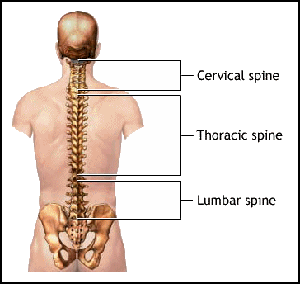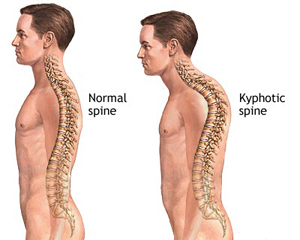Thoracic Pain
The thoracic spine lies between the lower back and neck region and is usually injured in people who sit bent forwards for long periods. Thoracic pain is especially common amongst students and computer workers, and those who lift constantly (such as nursing mothers). The symptoms typically include pain between the shoulder blades and occasionally difficulty in taking a deep breath. Sometimes the pain can be felt in the front of the chest.
Sport & Spinal Physiotherapy has helped many clients from Gungahlin and the wider Canberra community with all types of thoracic pain syndromes.
Costovertebral Joint Sprains
The joints between the ribs and the spine (costovertebral joints) are the most commonly injured structure in the thoracic spine. The joints are typically sprained during excessive bending, lifting, arching or twisting movements. They can be injured traumatically or due to repetitive or prolonged forces such as when sitting bent forward for long periods.
Thoracic Facet joint sprain
Facet joint pain occurs more often in the lower back but can occur in the thoracic spine especially as the spine degenerates with age. Symptoms include pain and associated muscle spasm especially in the morning or after sitting in a fixed position for long periods.
Postural Syndrome
Postural syndrome is a condition that is caused by adopting poor posture over a prolonged period of time. This may occur in any position such as standing or lying, but is particularly common during sitting at a computer or driving. The adopted poor posture position places sustained stress to the soft tissue structures at the thoracic spine leading to pain.
Scheuermann’s disease
Scheuermann’s disease is a self-limiting skeletal disorder of childhood where the anterior vertebral angle is often greater than the posterior, typically resulting in the signature “wedging” shape of the vertebra. This leads to an increased thoracic kyphosis (hunchback) or curvature of the spine, which can lead to pain and deformity. The seventh and tenth thoracic vertebrae are most commonly affected. In very serious cases it may cause internal problems and spinal cord damage.
Scoliosis
Scoliosis is a medical condition in which a person’s spine is curved from side to side. Although it is a complex three-dimensional deformity, on an x-ray, viewed from the rear, the spine of an individual with scoliosis may look more like an “S” or a “C” rather than a straight line. It can occur at birth or develop gradually during adolescence from poor posture or from a neuromuscular disorder. Clients who have reached skeletal maturity are less likely to have a worsening case. Some severe cases of scoliosis can lead to diminished lung capacity, increased pressure on the heart, and restricted ability for physical activities.
Thoracic outlet syndrome
Thoracic outlet syndrome (TOS) is a syndrome involving compression of nerves and blood vessels passing between the neck muscles located at the side of the neck (scalenes). The compression may be positional caused by movement of the collarbone and shoulder girdle on arm movement, or it may be static caused by enlargement of the scalene muscles. Symptoms usually involve pain, pins and needles or numbness, and reduced blood circulation down the arm on the affected side.
How can we help thoracic pain?
In most cases, physiotherapy alone offers an effective solution for most thoracic injuries. On your first visit, our physios will establish a correct diagnosis to direct the most effective care to your injury. Establishing the correct diagnosis early is imperative as several injuries mimic symptoms yet have different treatment protocols. We use our unique ‘phase based rehab system’ to ensure all aspects of a full and lasting recovery are delivered. We will tailor a treatment plan to suit your needs, with you involved in the decision making. Our physios will use hands on therapy techniques to improve joint mobility and muscle flexibility. We will nearly always at each session provide home exercises of stretches and strength work so that you keep improving between sessions. Early treatment will be focused on reducing pain and regaining range of motion. The physiotherapist will then prescribe an exercise program to improve upper back strength and scapular muscle control, which are important for preventing re-injury. Massage, hydrotherapy, dry needling and our gym may also be used for best outcome. Towards the end of the treatment program you will be given prevention strategies to keep the pain away. The sooner we begin your thoracic pain rehabilitation, the faster the recovery and back to the things you love doing.
Why choose us for your thoracic pain?
- We listen, we care and we get results
- We provide physiotherapy to fix the cause of your thoracic injury and not just the symptoms
- Our physios have extensive experience in dealing with all types of thoracic pain problems
- We can advise you of the ideal workstation set-up to help your thoracic pain
- We can correct your posture in sitting, standing and lying
- We can help improve spinal alignment in scoliosis during the growing years
- Our therapists have completed further education on best practice thoracic injury management
- We can prescribe practitioner only natural supplements for pain and inflammation
- Our gym helps with late stage strength rehabilitation for thoracic injuries
- Our massage therapists can help sort out any tight muscles
- Hydrotherapy can help restore joint range particularly in the early stages of rehab
- We can provide dry needling for pain management and accelerated healing
- We can refer you for further investigations such as x-ray or MRI if required
- Our therapists have been recognised for their expertise having been national sporting team consultants
- We provide you with the tools to look after your health long after you leave our care
- We provide you with a guided return to work and sport
- We have lumbar supports and posture support braces to help improve your sitting posture
- We have cervical pillows to help improve thoracic pain associated with a poor sleeping position

